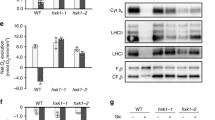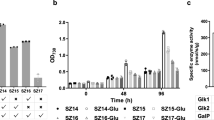Abstract
THE energy requirements of certain green algae can be met by photosynthesis when they are supplied with carbon dioxide in light, or by chemosynthesis, using organic substrates, in light or darkness. Bristol Roach1, Neish2, Taylor3 and Samejima and Myers4 have found considerable differences in the ability of various species of algae to utilize carbohydrates as energy sources, but all have found xylose to be among those which cannot be metabolized.
This is a preview of subscription content, access via your institution
Access options
Subscribe to this journal
Receive 51 print issues and online access
$199.00 per year
only $3.90 per issue
Buy this article
- Purchase on Springer Link
- Instant access to full article PDF
Prices may be subject to local taxes which are calculated during checkout
Similar content being viewed by others
References
Bristol Roach, M., Ann. Bot., 40, 149 (1926).
Neish, A. C., Canad. J. Bot., 29, 68 (1951).
Taylor, F. J., “Studies on the Uptake and Utilization of Glucose by Scenedesmus quadricauda”, Ph.D. thesis, University of London (1957).
Samejima, H., and Myers, J., J. Gen. Microbiol., 18, 107 (1958).
Pearsall, W. H., and Loose, L., Roy. Soc., B, 121, 451 (1936–37).
Calvin, M., J. Chem. Soc., 1895 (1956).
Author information
Authors and Affiliations
Rights and permissions
About this article
Cite this article
HASSALL, K. Xylose as a Specific Inhibitor of Photosynthesis. Nature 181, 1273–1274 (1958). https://doi.org/10.1038/1811273a0
Issue Date:
DOI: https://doi.org/10.1038/1811273a0
This article is cited by
-
Sugarcane Bagasse Hydrolysate as Organic Carbon Substrate for Mixotrophic Cultivation of Nannochloropsis sp. BR2
Waste and Biomass Valorization (2021)
-
Induction of D-xylose uptake and expression of NAD(P)H-linked xylose reductase and NADP + -linked xylitol dehydrogenase in the oleaginous microalga Chlorella sorokiniana
Biotechnology for Biofuels (2014)
Comments
By submitting a comment you agree to abide by our Terms and Community Guidelines. If you find something abusive or that does not comply with our terms or guidelines please flag it as inappropriate.



